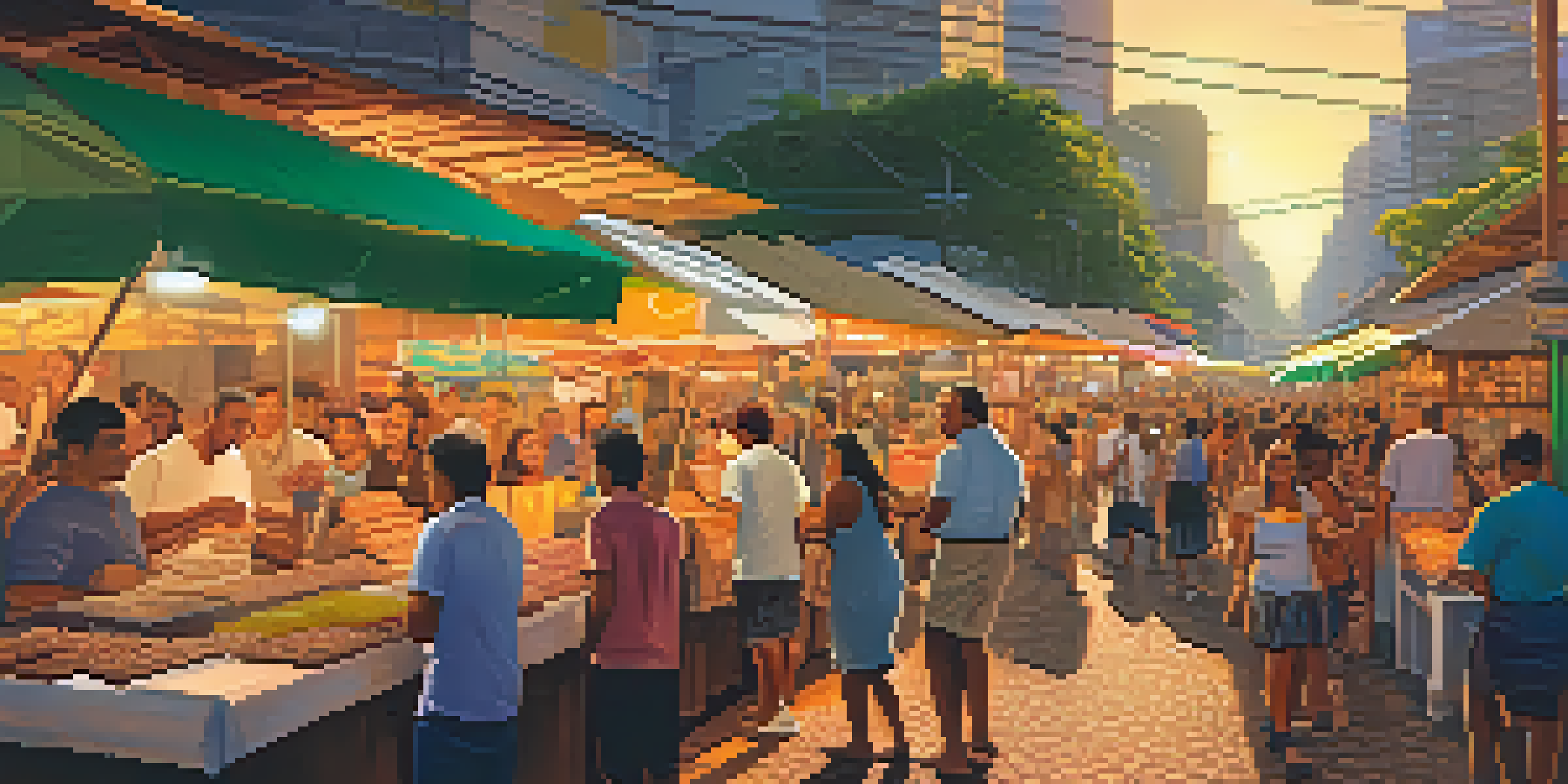Rio de Janeiro: Celebrating Culinary Traditions and Innovations

The Roots of Rio's Culinary Heritage
Rio de Janeiro's culinary landscape is a vibrant tapestry woven from its diverse cultural influences. From indigenous ingredients to Portuguese techniques, each dish tells a story of the city's rich history. For instance, the famous feijoada—a hearty black bean stew—is a delightful fusion that highlights the African heritage brought to Brazil.
Food is our common ground, a universal experience.
Moreover, the use of local ingredients plays a significant role in shaping these traditional recipes. Fresh seafood from the Atlantic, tropical fruits like guava and açaí, and staple grains such as rice and beans are essential to Rio's culinary identity. This connection to local produce not only enhances flavors but also supports sustainable practices.
As we delve deeper into Rio's food scene, we uncover how these traditional dishes are not just relics of the past but living entities that continue to evolve. Chefs embrace their roots while experimenting with flavors and presentation, crafting a unique culinary experience that celebrates both history and innovation.
Street Food: The Heartbeat of Rio's Culinary Scene
No exploration of Rio's cuisine is complete without a taste of its vibrant street food. From savory snacks to sweet treats, the streets of Rio are alive with tempting aromas and colorful stalls. One cannot miss the iconic pastéis, deep-fried pastries filled with cheese, meat, or vegetables, which are perfect for a quick bite while exploring the city.

Another local favorite is the acarajé, a deep-fried ball made from black-eyed peas, often filled with shrimp and served with spicy sauces. This dish showcases the Afro-Brazilian influence in Rio's culinary landscape, illustrating how street food serves as a delicious bridge between cultures. It's not just about satisfying hunger—it's about experiencing the city's vibrant culture.
Culinary Heritage Shapes Identity
Rio's diverse culinary landscape reflects its rich history and cultural influences, blending indigenous, Portuguese, and African ingredients and techniques.
Moreover, street food in Rio is an ever-evolving canvas for creativity. Many vendors take traditional recipes and add their unique twists, making each bite an exciting adventure. This innovation keeps the culinary scene fresh and engaging, drawing locals and tourists alike to indulge in the bustling street food culture.
Fine Dining: A Taste of Modern Rio
While street food captures the essence of Rio's culinary spirit, fine dining establishments take it to new heights. Chefs in Rio are redefining Brazilian cuisine by incorporating global influences and modern techniques. These restaurants often feature tasting menus that showcase the best of local ingredients, providing diners with an unforgettable experience.
Cooking is like love. It should be entered into with abandon or not at all.
One notable trend in Rio's fine dining scene is the use of innovative cooking methods, such as sous-vide and molecular gastronomy. These techniques allow chefs to experiment with textures and flavors, resulting in dishes that surprise and delight the palate. For example, a typical dish might be deconstructed to highlight its individual components, creating a playful and artistic presentation.
Additionally, many fine dining restaurants in Rio emphasize sustainability and local sourcing. This commitment not only supports local farmers and fishermen but also enriches the dining experience by connecting diners to the region's agricultural bounty. As a result, guests can savor dishes that reflect the true essence of Rio, combining tradition with contemporary flair.
The Influence of Global Flavors
Rio de Janeiro's culinary scene is a melting pot of global influences, with flavors from around the world seamlessly blending into its traditional dishes. Italian, Japanese, and Middle Eastern cuisines have all left their mark, enriching the local culinary landscape. This fusion is especially evident in restaurants that creatively incorporate international ingredients into classic Brazilian recipes.
For instance, sushi has become incredibly popular in Rio, with many local chefs infusing Brazilian ingredients into their rolls. Imagine a sushi roll featuring fresh mango and cilantro, adding a tropical twist to this Japanese favorite. This blending of cultures not only caters to diverse palates but also reflects Rio's cosmopolitan spirit.
Street Food Embodies Local Culture
The vibrant street food scene in Rio not only satisfies hunger but also serves as a delicious representation of the city's dynamic culture and traditions.
Furthermore, this global influence has sparked a culinary dialogue, encouraging chefs to experiment and innovate. As they draw inspiration from international cuisines, they create new dishes that resonate with both locals and visitors. The result is a dynamic food scene that continually evolves, inviting everyone to explore its delicious offerings.
Celebrating Festivities with Food
Food plays a central role in Rio de Janeiro's vibrant festivals and celebrations, bringing communities together in joyous feasts. One of the most famous events is Carnival, where street parties overflow with music, dance, and, of course, delicious food. Traditional dishes like bolinho de bacalhau, codfish fritters, are enjoyed by revelers, showcasing the spirit of the celebration.
During the Festa Junina, celebrated in June, you can find a variety of traditional foods that highlight regional flavors. Dishes like pamonha (corn pudding) and canjica (sweet corn pudding) are staples during this festive time, allowing families to gather and share in the joy of community and tradition. These celebrations are not just about food; they are about the connections created over shared meals.
Moreover, these culinary traditions during festivals reflect Rio's cultural diversity, as different communities bring their unique flavors to the table. This rich tapestry of food not only highlights the region's heritage but also fosters a sense of belonging and pride among its residents, making every bite a celebration of identity.
The Role of Culinary Education in Innovation
Culinary education in Rio de Janeiro plays a pivotal role in shaping the future of its culinary scene. With a growing number of culinary schools and programs, aspiring chefs are being equipped with the skills to innovate while respecting traditional techniques. These institutions encourage creativity and experimentation, fostering a new generation of culinary talent.
Students are exposed to a variety of cuisines, techniques, and philosophies, enabling them to develop their unique culinary voice. Many graduates are now returning to Rio, eager to contribute their knowledge and skills while putting a contemporary twist on classic dishes. This influx of fresh ideas and perspectives is essential for the culinary evolution of the city.
Future Focus on Sustainability
Rio's culinary scene is evolving with an emphasis on sustainability and innovation, as chefs blend traditional dishes with modern techniques and ethical sourcing.
Furthermore, culinary education emphasizes the importance of sustainability and ethical sourcing. By incorporating these principles into their training, chefs are better prepared to create dishes that not only delight the palate but also respect the environment. This focus on responsible cooking will undoubtedly shape the future of Rio's culinary landscape for years to come.
The Future of Rio's Culinary Scene
As we look ahead, the culinary scene in Rio de Janeiro is poised for exciting developments. With a growing emphasis on sustainability, local sourcing, and culinary innovation, chefs are continually reimagining traditional dishes to meet modern demands. This evolution reflects a broader trend in the culinary world, as diners become more conscious of their food choices.
Moreover, technology is playing an increasingly important role in Rio's food landscape. From food delivery apps to social media marketing, chefs and restaurateurs are leveraging digital tools to connect with their audiences and promote their culinary creations. This shift not only enhances the dining experience but also allows for greater accessibility to diverse cuisines.

Ultimately, the future of Rio's culinary scene lies in its ability to balance tradition with innovation. As chefs honor their heritage while embracing new ideas, the city's food landscape will continue to flourish, inviting everyone to explore its rich flavors and culinary adventures.